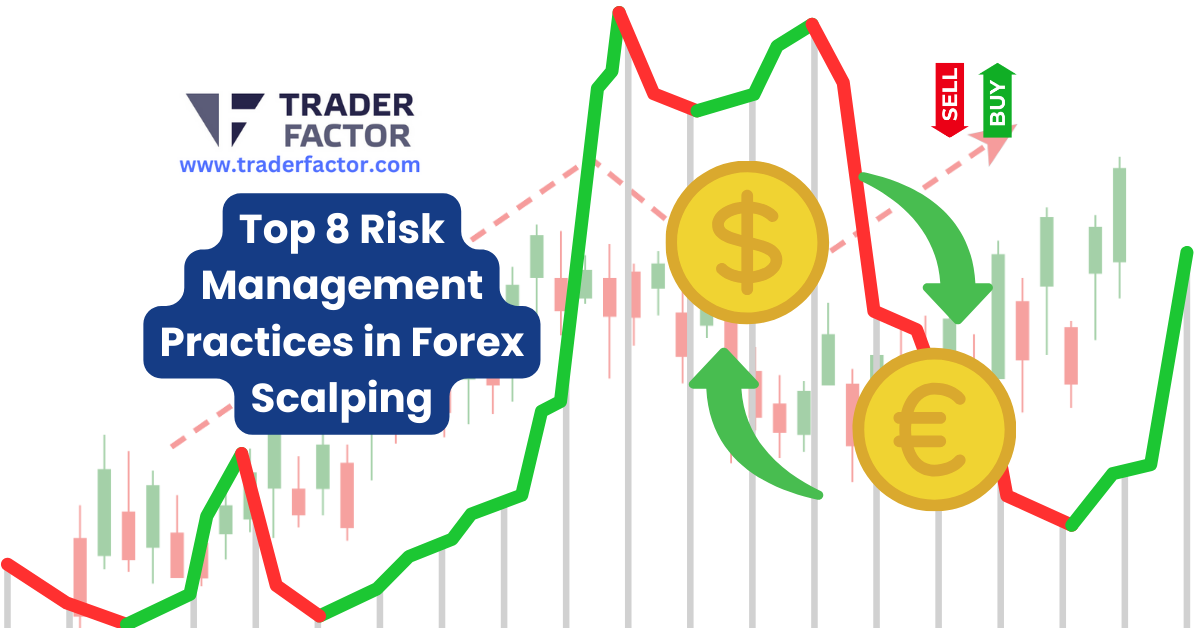Imagine you’re a seasoned forex scalper, and you’ve just experienced a significant loss due to an unexpected market shift. You feel like you’ve been knocked off your feet, questioning where you went wrong.
Such situations are common in the high-speed, high-risk world of forex scalping, but they can often be mitigated with the right risk management practices.
By examining the top eight risk management strategies for forex scalping, you’ll be better equipped to navigate these choppy market waters.
Stay tuned to discover how you can fortify your trading approach and potentially prevent such losses in the future.

Understanding Forex Scalping Risks
To fully grasp the potential pitfalls in forex scalping, you need to understand its inherent risks and how they can impact your trading results. Scalping, as you may know, involves making numerous trades within a short time frame, aiming to capitalize on small market movements. It’s a strategy that’s fast-paced and requires a high level of concentration.
One of the major scalping strategy pitfalls is the lack of predetermined exit points. When you’re in the thick of trading, it’s easy to get caught up in the excitement and forget to set stop-loss or take-profit points. This can lead to significant losses if the market swings in the wrong direction.
Another pitfall is the high transaction costs. Because you’re making so many trades, the costs can quickly add up and eat into your profits. It’s crucial to be aware of these costs and factor them into your trading plan.

Establishing a Risk-Reward Ratio
Given the inherent risks in forex scalping, it’s vital to establish a solid risk-reward ratio to safeguard your investments and maximize profits. This ratio is a measure of the profit you expect to make for every dollar you risk. Setting boundaries on potential losses versus gains is a critical step in this process.
For instance, if you set a risk-reward ratio of 1:3, it means you’re willing to risk $1 to make $3. This approach ensures you’re not just chasing profits blindly, but are also keeping potential losses in check.
Profit calculation comes next. It’s not just about how much you make, but also how consistently you do so. If you’re making huge gains one day but heavy losses the next, it’s not sustainable. Strive for consistent, modest profits.

Implementing Stop-Loss Orders
In your forex scalping journey, stop-loss orders become your safety net, protecting you from severe market downturns. They’re an essential tool in your risk management toolkit. Stop loss strategies help you preset the maximum loss you’re willing to take on a trade, thus preventing any emotional decision making in the heat of the moment.
Position sizing is another crucial element when implementing stop-loss orders. It’s about determining how much you’re ready to risk on each trade. You don’t want to put too much on the line for a single trade, do you? That’s why it’s crucial to balance your position size with the stop-loss level you set. The higher the risk, the smaller your position should be, and vice versa.
Lastly, always remember to adjust your stop-loss orders as the market moves in your favor. It’s called ‘trailing’ your stop loss. This way, you lock in profits and limit your downside at the same time.
With disciplined use of stop-loss orders and smart position sizing, you’ll be well on your way to successful forex scalping. So, don’t underestimate their power. They’re your best friends in this risky business.

Maintaining Effective Leverage
While mastering stop-loss orders is crucial, you can’t overlook the importance of maintaining effective leverage in your forex scalping strategy. Leverage optimization is a key aspect of this. It’s about finding the right balance — leveraging enough to amplify potential profits, but not so much that you’re exposing yourself to unmanageable risk.
Let’s talk about margin management. This is the practice of managing the funds you have available in your account to hold open trades. You’ve got to always ensure that you have enough margin to withstand potential losses.
Maintaining effective leverage isn’t just about setting a leverage ratio and forgetting about it. It’s a dynamic process. You’ll need to adjust your leverage based on your risk tolerance, market volatility, and other factors. Remember, increased leverage can mean increased profit potential, but it also amplifies potential losses.
You’ll want to use leverage sparingly and wisely. It’s a powerful tool in your forex scalping arsenal, but like any tool, it can cause damage if used improperly. So tread carefully, keep an eye on your margin, and stay on top of leverage optimization.
It isn’t easy, but it’s worth it.

Importance of Diversification
Spreading your investments across different currencies is a must-do, offering a safety net in your forex scalping strategy. Diversification isn’t just a buzzword; it’s a strategic game-changer. It helps maintain portfolio balance and ensures proper asset allocation.
Diversification offers several advantages:
- Risk reduction: By investing in various currencies, you’re less impacted by a single currency’s volatility.
- Portfolio balance: Diversification helps maintain a healthy portfolio balance, minimizing losses and optimizing profits.
- Asset allocation: A well-diversified portfolio ensures optimal asset allocation, reducing dependency on a single currency.
- Profit opportunities: Diversification provides more opportunities for profit, as different currencies can perform well at different times.
- Financial stability: Diversification enhances overall financial stability by spreading your risk.
Diversification is vital for your financial health. It’s like a safety net that catches you when a particular currency falls. It’s a protective mechanism that shields your portfolio from the unpredictability of forex markets.

Regular Market Analysis
You can’t ignore the significance of regular market analysis in forex scalping risk management.
It’s about spotting market trends, understanding the role of economic indicators, and using technical analysis effectively.
Let’s unpack these key points and see how they can help you manage your risks better.
Identifying Market Trends
To effectively manage risks in forex scalping, it’s critical to regularly analyze market trends and adjust your strategies accordingly. Using trend prediction techniques and recognizing trend reversal signals can help in this process.
Here are some steps you can take:
- Utilize technical analysis tools to identify trend patterns.
- Keep an eye out for trend reversal signals to avoid losses.
- Use trend prediction techniques to anticipate market movements.
- Continually educate yourself on market dynamics and fluctuations.
- Stay updated with global economic events that could impact market trends.
Importance of Economic Indicators
While analyzing market trends is crucial, it’s equally important to understand the role of economic indicators in regular market analysis. These indicators provide invaluable insights into the health of economies, influencing forex prices and offering you a competitive edge. Economic forecast impact is a key element in predicting future currency movements. For instance, an upward revision in GDP growth can strengthen a nation’s currency.
Indicator driven strategies, on the other hand, can help you make informed trading decisions. These strategies rely on data such as inflation rates, employment figures, or retail sales to predict market trends. So, don’t just react to market changes, anticipate them. Understand the economic indicators, watch forecasts, and develop strategies based on this information.
Your trading success significantly depends on it.

Utilizing Technical Analysis
Technical analysis serves as a vital tool in your forex scalping risk management arsenal, allowing you to interpret past market data and predict future price trends. It’s not merely about looking at numbers; instead, it’s a way of understanding the market’s psychology and anticipating its next moves.
Here’s how you can make the most of it:
- Use chart patterns to identify trend continuations or reversals.
- Don’t solely rely on one indicator; cross-verify with others for reliability.
- Watch for divergences between indicators and price as potential reversal signals.
- Understand that indicators aren’t foolproof; they’re tools to aid decision-making.
- Regularly review and adjust your technical analysis strategies to stay in tune with market changes.

Embracing Continuous Learning
In forex scalping, you must embrace continuous learning to keep up with ever-changing market trends. By consistently enhancing your trading skills, you’ll stay ahead of the curve.
Don’t forget to utilize educational resources consistently, they’re crucial for your ongoing growth in this field.
Understanding Market Trends
Regularly tracking and understanding market trends is an essential habit you need to develop in the world of Forex scalping. It’s crucial for trend reversal identification and aids in predictive trend modeling. This enables you to anticipate possible shifts, allowing for strategic trades.
Keep an eye on economic indicators; they often signal potential trends.
Analyze historical data; trends often repeat over time.
Use predictive trend modeling to anticipate future market movements.
Look out for trend reversal signals to protect your investment.
Stay updated on global events that might influence the Forex market.
Enhancing Trading Skills
Ever considered how enhancing your trading skills can significantly boost your Forex scalping success? It’s all about embracing continuous learning.
Developing trading discipline, for example, is crucial. This involves sticking to your trading plan, even when the market seems unpredictable. It’s about controlling your emotions, making rational decisions, and not letting greed or fear dictate your actions.
Another practical approach is adopting backtesting strategies. By applying your trading plan to historical data, you’re able to gauge its efficiency, adjust it accordingly, and build confidence in its potential success. It’s a concrete way to test your strategies before putting real money on the line.
Utilizing Educational Resources
To keep pace in the fast-moving world of Forex scalping, it’s essential you’re continually upgrading your knowledge base by utilizing a variety of educational resources. The internet offers a treasure trove of resources for continuous learning.
Consider: – Subscribing to credible Learning Platforms that specialize in Forex trading. They offer a wealth of information ranging from basic to advanced trading strategies. – Participating in Interactive Webinars conducted by industry experts. They provide real-time insights and tips. – Reading books and eBooks written by experienced Forex traders. – Joining online trading forums and communities to learn from other traders’ experiences. – Following financial news and blogs to stay updated on market trends and economic indicators.

Emphasizing Emotional Control
While trading forex, it’s crucial you maintain emotional control to prevent hasty decisions that could undermine your risk management strategies. Psychological resilience plays a significant role in achieving this control. It’s your ability to bounce back from losses and persist through challenging market conditions. In essence, it’s your personal buffer against the mental toll that forex scalping can take.
Emotional intelligence, on the other hand, is about recognizing your emotional states and understanding their impact on your trading decisions. It’s the aptitude that allows you to step back when your emotions are running high and reassess your strategy objectively.
You’re not a trading robot, emotions will inevitably come into play. But, it’s important you don’t let them dictate your trades. Reacting impulsively to market fluctuations can lead to poor decision-making and increased risks. Instead, strive to keep a cool head, approach each trade analytically, and stick to your pre-determined risk management plan.

Frequently Asked Questions
What Are the Common Tools Used in Forex Scalping?
You’d typically use scalping software for efficiency in forex scalping. It helps monitor market volatility’s impact. Common tools include technical analysis software, trading platforms, and automated trading systems. They’re crucial for quick decision-making.
Can a Beginner in Forex Trading Start With Scalping?
Yes, you can start with scalping as a beginner in forex trading. However, it’s crucial to understand scalping strategies and be aware of scalping risks to mitigate potential losses and maximize gains.
How Does the Time of Day Affect Forex Scalping?
Time of day greatly impacts forex scalping. You’ll notice fluctuations due to Time Zone Differences and Daylight Saving Impact. It’s crucial to monitor these changes to maximize your scalping strategy’s effectiveness.
Are There Specific Forex Pairs That Are More Suitable for Scalping?
Yes, there are specific forex pairs more suitable for scalping. Scalping friendly pairs like EUR/USD or GBP/USD often increase scalping’s profitability due to their tight spreads and high liquidity, making them ideal for quick trades.
What Is the Average Duration of a Scalping Trade in Forex?
In forex scalping, the average duration of a trade is typically short, often just a few minutes. Your scalping duration can impact your success, so mastering short-term scalping techniques is crucial.

Conclusion
So, you’ve got the top eight risk management practices for forex scalping.
Remember, establish a sound risk-reward ratio and implement stop-loss orders.
Keep your leverage effective, diversify your portfolio, and never skip regular market analysis.
Don’t stop learning and always keep your emotions in check.
Following these practices won’t guarantee success, but they’ll certainly put you in a better position to make the most out of your forex scalping endeavors.
Author
-

Zahari Rangelov is an experienced professional Forex trader and trading mentor with knowledge in technical and fundamental analysis, medium-term trading strategies, risk management and diversification. He has been involved in the foreign exchange markets since 2005, when he opened his first live account in 2007. Currently, Zahari is the Head of Sales & Business Development at TraderFactor's London branch. He provides lectures during webinars and seminars for traders on topics such as; Psychology of market participants’ moods, Investments & speculation with different financial instruments and Automated Expert Advisors & signal providers. Zahari’s success lies in his application of research-backed techniques and practices that have helped him become a successful forex trader, a mentor to many traders, and a respected authority figure within the trading community.
View all posts













